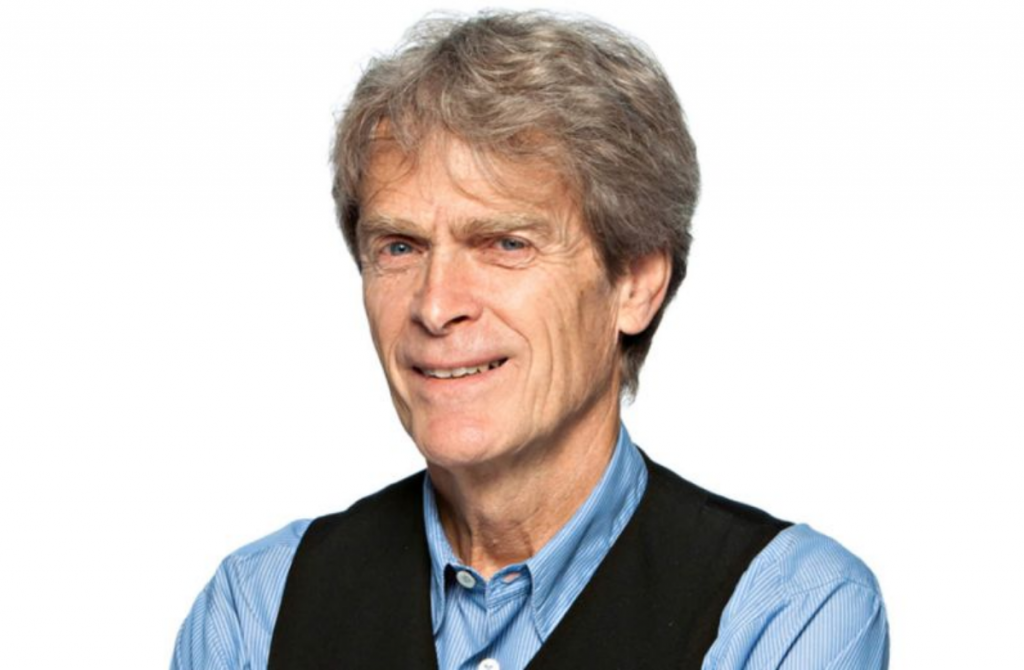LBB’s Addison Capper speaks to the founder of BBH and co-founder of The Garage Soho about the future of ad industry awards, the meaning of effectiveness in 2021, and why funny ads don’t win big anymore
AME Awards, the effectiveness focused award show from New York Festivals, has partnered with Little Black Book to sponsor the Awards & Events channel. This channel is a place for general news about award wins and any events being held, but it’s also a place to discuss the trends impacting and changing award shows, such a prevalent part of our industry.
As part of this partnership, we’ll be interviewing some of the advertising industry’s brightest minds and most revered leaders on the meaning of effectiveness in 2021, the advertising awards landscape of the future, and just about anything and everything that might come up along the way. First up in the series is none other than Sir John Hegarty, a founder of BBH and currently co-founder at The Garage Soho. He chats with LBB’s Addison Capper.
LBB> An IPA report suggested that award-winning work is becoming less effective. Why do you think that is?
John> Well, I think the IPA report concluded that less awarded work was being effective due to the kind of work that’s being entered into awards. If you look at the work, a lot of it is framed around important issues but for very marginal organisations, who don’t spend the money that you need to spend to make advertising work. Therefore, they’re having no impact. I think the fact that brands are responding to things like Black Lives Matter and other social issues that are around in the world today is good, but on the other hand, I buy my marmalade because it’s made from organic oranges, it’s made in a way which is not harmful to the environment, and I’m not really into whether they support a social issue or not. I think it’s lovely if they do and if it’s their belief that they should do so then I congratulate them and say well done, but that is not actually why I’m buying it. We’ve gone into this weird world where to win awards, juries are kind of encouraging this work because they keep giving awards to this kind of work, so therefore more creative people produce it, and they give it more awards. Instead of: “here’s a great ad for a soap powder”.
LBB> You’ve been quite vocal on scam ads in the past but a lot of things that are entered into award shows these days aren’t necessarily a scam but may have run just once on one billboard or on an app for one day. What are your thoughts on that?
John> It is very difficult. I think award schemes will have to start isolating those pieces of work and create a category for them so they can be noted and judged, which I think is all good. But they’re not really moving the business of advertising forward, and that’s the problem that we have. We enter our work into award schemes because we want to show how creativity affects effectiveness and how it creates success. That’s the reason for doing it. If award schemes are somehow navigating this new world they’re in, showing work that had a genuine impact on the marketplace, then I think they’re failing.
It’s interesting that at Cannes, when you look at their effectiveness award you’re seeing so few of these issue based schemes winning because they can’t prove anything. It’s a shame for our industry.
D&AD came into being because it wanted to prove that great creative work actually worked in creating effectiveness. That’s one of their great causes and they were ultimately proven right, but the creative world has withdrawn almost from representing true commercial issues, as in: “I’m selling a product here, these are the values that surround this product, and this is why you should buy it”. We’ve almost withdrawn from that and I think that’s a great shame.
Somebody asked me if I’d seen any advertising recently that I liked, and I talked about the milk drink – or the oat drink – called Oatly. I think it’s terrific, I really think it’s great. They’ve got a product that’s not made from dairy but made from oats, so it’s an issue slightly, but they advertise it in a very, very overtly commercial way, but a very positive commercial way. And they’ve captured my imagination and attention. Lo and behold, they’re now possibly getting an IPO in America for some ridiculous sum of money. You’d think that’s all we want more of, but we’re not getting it. Look at the press, there’s nobody talking about a great ad for an orange juice, and I’m just getting tired of it. The short answer is that I think the IPA report was right.
LBB> I was actually going to ask you why you thought not many funny ads win awards these days, and I feel like that point is a good segue into that.
John> I think that today we have creative people who don’t know how to write great funny ads. They don’t know how to do that. I look at some of the work that gets awarded, and I think, yeah that’s not bad, but oh, god, it’s nowhere near as good as something that was done 25 or 30 years ago, something that was really funny, really effective and got people talking. We also have a lack of understanding of our history. We’re unique as a creative industry that has very little regard for what’s gone before. If you talk to a fashion designer and you say ‘Coco Chanel’, they would instantly understand who you were talking about and her impact on the fashion industry. Or if I was talking to an architect, they’d understand who Frank Lloyd Wright was. In our industry, you can literally say to a young creative today, ‘John Webster’, and they wouldn’t know who you’re talking about. It’s a great shame because I think they’re losing the value of this experience that these people put into their work and the creativity they put into it.
LBB> Why do you think that is?
John> Because I think that over the last 25 years, they’ve been told that great writing doesn’t matter; if you want to win an award, you can win an award by creating some stunt; creating a long-term viable campaign isn’t really something clients look to anymore, so they don’t bother doing it. So, in a way, the market has driven them. This artificial market, I’d almost call it, has driven them to this place. The rise of digital has said that it’s not about creativity, it’s about an algorithm that gets to your audience and that’s how you gain success. Go and have a look at what Martin Sorrell’s MediaMonks are producing, look at their showreel, it’s diverse and competent, very professional. But it’s not going to change the world. He believes in the power of algorithms to generate effectiveness rather than creativity. Of course data is important but without capturing people’s imagination it’s valueless. Let’s see what happens. It’s a strange place we’re in. With the new rules Apple and Google are introducing, stopping you tracking users, algorithms are going to become less effective. Perhaps then brands will have to start thinking about being creative.
LBB> With that in mind, how do you feel the measure of effectiveness has changed over the years? Have we lost something of a gut feeling these days?
John> Effectiveness was always done against a set of criteria. For instance, one of things that we were doing with Audi advertising was not trying to sell more cars – we were trying to support the second-hand car market. If you support the second-hand value of an Audi, you actually increase the value of a new Audi because when people buy a car, they calculate how well it will hold its second-hand value. So, in some markets it’s quite hard to determine what the effectiveness is. Obviously, you know and your client knows but outwardly it can be slightly confusing. Effectiveness might be that you’re stopping somebody doing something.
Of course, effectiveness is a very broad subject, but overall, there are lots of tools around to measure what you’re doing, and I think we have forgotten long term effectiveness as well as short term. I might have made some sales today, but actually I’m also trying to make it easier for me to make sales tomorrow, so my advertising is seen as an investment – the more you put in, the more you’ll get back. We’re failing to measure that and we’re failing to build, I would say, great brands. I’m not sure how many great brands have been built through the medium of marketing over the last 20 years. Certainly, they’ve been built through technology. Tesla has hardly done an ad and it’s one of the most valuable car companies in the world. You’ve always got to be careful how you define effectiveness, and each brand defines it for themselves.
LBB> Is there a brand from your time at BBH that you think you did the most effective work for?
John> Certainly, I think the Levi’s 501 campaign has always been held up as an example of absolute outstanding effectiveness. The ad had to be taken off TV because they couldn’t meet supply. It changed all kinds of dimensions, changed fashion and changed music, made people start wearing boxer shorts – it had a profound impact. Audi was successful, very successful, but it was a combination of brilliant engineering and stuff that made the cars more desirable. A lot of what we did for the launch of Häagen-Dazs back in 1992 was incredibly successful. Boddingtons was another huge success, as was Lynx / Axe, the growth of that brand was tremendous with the Axe Effect. We had lots of examples of effectiveness and each brand measured it in their own particular way because of where they were in the marketplace.
But those types of brands seem to have withdrawn from the market. Beer brands are no longer promoting themselves and are creating global campaigns that really don’t talk to a cultural force within a nation. Funnily enough, one of the companies that we’ve invested in at The Garage, one of the Heineken family is also an investor. We met three or four years ago, and he asked me about Heineken’s advertising. I said that I think Heineken advertising is just meaningless. At the time it was ‘Open Your World’ or something. I can see how when sitting in some global meeting, someone says ‘Open Your World’ and everybody nods and says, ‘ooh, this is great’, but it means nothing to me. Whereas, I dislike the man intensely, but when Boris Johnson, our prime minister, was presenting some policies to the electorate he said: “I’m about to present some policies that refresh the parts that other policies cannot reach.” He was quoting a famous Heineken advertising line that hadn’t been used for 20 years. I doubt 20 years from now a politician will be quoting Open Your World. We’ve lost that connection with our audience. The advertising industry has gone to being a stalker concept as opposed to a seducer. We now believe that stalking is the way to actually create success, as opposed to seducing. And I think that’s a real worry.
LBB> What are your thoughts on the future of awards, given the situation with Covid?
John> I think some will go by the wayside. I’m surprised at the number that have survived. Remember, Darwin wasn’t really about survival of the fittest, it was survival of those able to adapt that would survive. I think Cannes has to think very, very hard about what it is, but it may be that because they get everybody together, it becomes more unique and people will love it. I think it creates tremendous opportunities for award shows because we’re increasingly looking at work that doesn’t talk to the mass of people, we’re looking at work that talks to our industry and those wishing to comment on our industry.
Five years ago, I said to Tim Lindsay [D&AD Chair], “why are you spending all this money bringing everybody to London when you could do it virtually?” Now of course, they’ve had to do that, and I don’t think they will go back to bringing everybody to London. Personally, I think that having done it and having made it work, they’ll stay with it. The cost is phenomenal. When you look at it, that’s money that could be going back into education, it could be going back to all the good things that they do. So, I think there will be change. Those that adapt to the new marketplace will obviously be the ones that survive, it creates a tremendous opportunity to make your awards scheme match fit, so to speak, for the new world. They definitely will continue, but not all of them in the form they’re in at the moment.
LBB> How does the industry get back to being seducers and stop creeping on people?
John> It has to go back to understanding. It has to understand that there are two factors: persuasion and promotion. What we’ve become obsessed with over the last 20 years is promotion. Virtually all social media is promotion: promote, promote, promote, promote. They’ve given up on persuasion: I have to persuade you that this is a great brand. There’s a great line: a brand is made not just by the people who buy it, but also by the people who know about it. That is so important, and we’ve forgotten that lesson. Take Rolls Royce. I’m sure neither you or I will ever buy a Rolls Royce. But we know who they are. We know what they stand for. We know what values they have. Therefore, it adds to their value and their desirability. We’ve forgotten that.
Just as we, as creative people, have forgotten to look back at the history of advertising, I think marketing people today have forgotten how to build a great brand. And somehow, we’re going to have to get back to that.
LBB> Why do you think the industry is so obsessed with the future and dismissive of the past?
John> One of the great things about advertising is that it is about the future. It has that relentless ‘what’s next?’ attitude, which I love about it. But of course, the downside of that, if you pursue it to such an extent, is that you forget the lessons that yesterday taught you. I always quote my wonderful history master, who came in when I was 11 years old, addressed the class and said: “I’m here to teach you history. The one thing you’ve got to learn about history is, history is about the future, not the past.” It was a brilliant way of saying, what you’ve learned from history is how to navigate the future and it teaches you things. But there’s a great belief that you don’t need to do that.
I’ve always said that virtually every marketing director goes down on their knees at night and says, “Dear God, please make it a science”, and God has come back and said, “I’ve tried, honestly, it just doesn’t work. I gave these people free will, and they keep fucking it up.” It isn’t a science, but they want it to be a science. Therefore, when digital comes along and says you can measure everything, they all jump up and down with joy and think, why waste money on advertising? And that’s where we are. And that’s why you haven’t got great, great brands being built.
Source: Little Black Book
MARKETING Magazine is not responsible for the content of external sites.
Join the MARKETING HOME OF FAME at the Malaysian Marketing Conference Discovery Edition on May 9th.
Learn more at https://marketingmagazine.com.my/cmo2025/
Proudly sponsored by MRT Corp and Media Prima Omnia
For bookings: ruby@adoimagazine.com
BOOK SEATS NOW










